Introduction
Healthcare in West Africa faces unique challenges due to a combination of high drug use, smuggling, and systemic issues. The iCARE Multi-Drug Screening Test is a pioneering solution that supports medical diagnostics and treatment across the region. Let’s explore how iCARE is revolutionizing healthcare in each West African country.
Country-Specific Healthcare Needs and iCARE’s Role
Nigeria
Nigeria struggles with a significant drug crisis, impacting healthcare delivery. The iCARE test aids in early diagnosis, allowing for timely intervention and effective treatment plans.
Ghana
Rising drug abuse trends in Ghana make medical diagnostics crucial. iCARE provides quick screening results, helping doctors identify drug-related conditions early.
Ivory Coast (Côte d’Ivoire)
With growing drug usage in Ivory Coast, healthcare requires innovative diagnostic tools. iCARE enhances healthcare professionals’ ability to diagnose and treat patients accurately.
Senegal
Senegal’s health system faces challenges in addressing drug-related health issues. The iCARE test offers improved diagnostic efficiency, aiding healthcare workers in treating patients.
Burkina Faso
Burkina Faso needs to address drug-related health issues urgently. iCARE plays a vital role in supporting healthcare workers, providing better care for patients.
Niger
Drug problems at Niger’s borders have led to healthcare challenges. iCARE helps in diagnosis and treatment, ensuring comprehensive care.
Mali
Drug trafficking in Mali poses health risks that require efficient screening tools. iCARE supports medical staff in diagnosing and treating drug-related conditions.
Guinea
Healthcare challenges in Guinea are exacerbated by drug-related problems. iCARE serves as a vital tool in health diagnostics, aiding healthcare providers.
Benin
Benin’s health sector needs advanced drug testing tools. iCARE contributes to health improvement by providing accurate and timely diagnostic results.
Togo
Togo’s healthcare system grapples with drug-related health issues. iCARE aids healthcare professionals in identifying and treating these conditions effectively.
Sierra Leone
Drug abuse impacts healthcare in Sierra Leone. iCARE supports public health by offering quick and accurate screening, crucial for patient care.
Liberia
Liberia’s healthcare infrastructure needs strengthening, especially in diagnostics. iCARE’s benefits extend to providing accurate diagnoses for better treatment outcomes.

Sierra Leone
Drug abuse impacts healthcare in Sierra Leone. iCARE supports public health by offering quick and accurate screening, crucial for patient care.
Liberia
Liberia’s healthcare infrastructure needs strengthening, especially in diagnostics. iCARE’s benefits extend to providing accurate diagnoses for better treatment outcomes.
Mauritania
Drug testing needs in Mauritania’s health sector are met by iCARE, supporting medical practice with its rapid diagnostic capabilities.
Guinea-Bissau
Guinea-Bissau faces health and drug-related challenges that iCARE addresses through enhanced diagnostics, helping healthcare workers.
The Gambia
Drug use impacts health in The Gambia. Implementing iCARE offers effective screening, supporting better health outcomes.
Cape Verde
Drug-related health concerns in Cape Verde require innovative solutions. iCARE’s improved health diagnostics offer a significant impact.
Conclusion
iCARE’s impact on West African healthcare is significant, providing much-needed support for effective medical diagnostics. Its role in improving healthcare is crucial as we look towards a future where drug-related health issues are identified and addressed early.
FAQs – Multi-Drug Screening Test
What is the iCARE Multi-Drug Screening Test used for in healthcare?
The iCARE Multi-Drug Screening Test is used to detect various illegal substances, helping healthcare professionals diagnose drug-related health issues.

